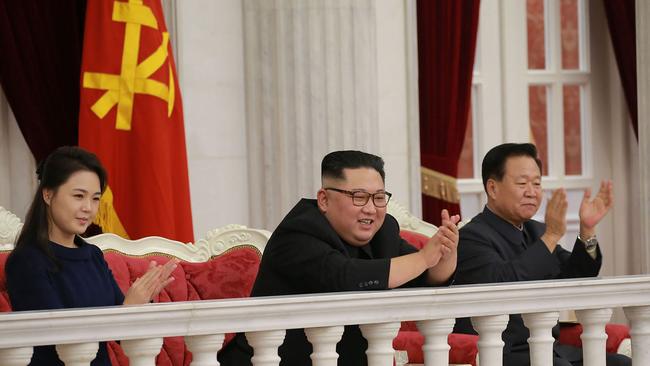The heat is on leaders to strike a deal in Hanoi
Donald Trump and Kim Jong Un are under pressure to come up with a credible deal in Hanoi that shows progress is being made.

Gone is the naive optimism — on the US side at least — that their meeting in Singapore last June would lead to immediate moves by North Korea to denuclearise.
In its place is a more realistic view of the need to set out practical steps to improve relations, which can be agreed at their second meeting on February 27-28.
“I look forward to seeing Chairman Kim and advancing the cause of peace,” the US President said in a tweet on Saturday.
The US goal is a denuclearisation process that can be independently verified.
Kim wants the US to officially declare an end to the 1950-53 war and to lift strict trade sanctions hurting his country’s already weak economy.
US officials, led by US Special Representative for North Korea Stephen Biegun, returned at the weekend from three days of negotiations in Pyongyang.
“We have some more hard work to do with the DPRK between now and (the summit),” Biegun told South Korean Foreign Minister Kang Kyung-wha.
Biegun plans to meet his North Korean counterpart, Kim Hyok-chol, again before the summit.
Some commitment to end the war and work towards a peace treaty is now expected to be part of the summit. The war ended with an armistice rather than a peace treaty and 28,500 US troops are still stationed in South Korea.
Biegun has already said Trump was “ready to end this war”.
Speculation is growing on whether the US will agree to lift some trade sanctions against North Korea to provide an economic carrot to encourage Kim to move forward with a plan for denuclearisation.
Under US and UN sanctions, North Korea cannot export its iron ore, coal and textiles — once a source of foreign exchange for the cash-strapped country.
The sanctions also constrain its ability to import crude oil and petroleum.
Trump hinted some easing of sanctions may be on the cards, holding out the prospect of some financial benefits.
“North Korea, under the leadership of Kim Jong-un, will become a great economic powerhouse,” he tweeted. “He may surprise some but he won’t surprise me because I have gotten to know him and fully understand how capable he is. North Korea will become a different kind of rocket — an economic one!”.
The first summit ended with a vague commitment to denuclearisation by Kim that subsequently led to US disappointment that no progress was being made on the deal they thought had been reached. In June, there was no commitment to a timetable or a verifiable process.
The past few months have shown that reaching a deal will be slower and more complicated than Trump would want, but with the President’s clear ambition to continue talks with Kim in the hope of a foreign policy win ahead of the 2020 election, US officials are focusing on smaller, more practical steps.
For his part, the 35-year-old Kim has shown a strong commitment to improving the North Korean economy, moving to allow some liberalisation of government controls in some areas and setting up 13 special economic zones for foreign investment.
One idea being considered is for the US and North Korea to set up liaison offices in each other’s countries to allow for more ongoing negotiations.
Another factor behind the scenes is the role of China’s President Xi Jinping, who has developed a strong relationship with Kim. Kim has visited China four times in the past year for talks with Xi. The Chinese leader is in the middle of trade negotiations with Trump, hoping to reach a deal by the end of the month.
Advice from Xi will be important in shaping Kim’s thinking in what is becoming a three-way interrelationship between the leaders. With talks going on over the next few weeks on both fronts — US-China and US-North Korea — all three leaders will be keen to be seen to be reaching some agreements to allow them to post some political wins.




Now that Donald Trump has confirmed he will meet with North Korean leader Kim Jong-un in Hanoi at the end of this month, the pressure is on both sides to come up with a credible deal that shows progress is being made.